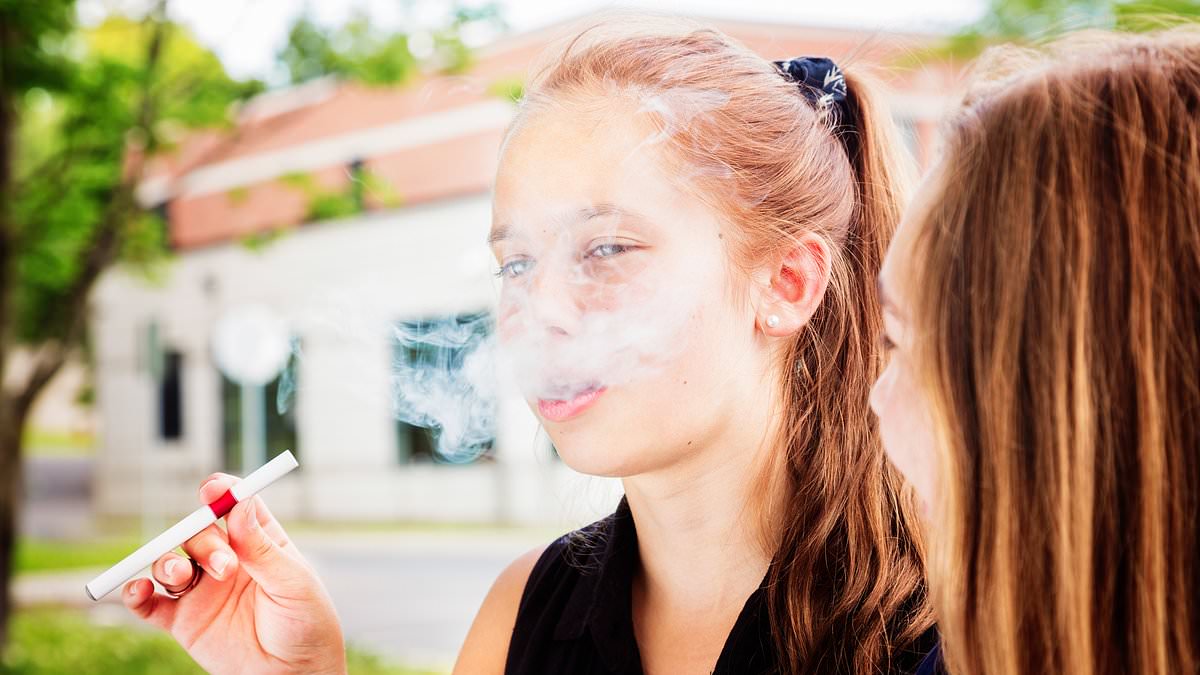Vaping, a habit shared by millions of Americans, is linked to depression, new research shows.
Australian researchers surveyed more than 5,000 students aged 12 to 14 about their mental health status and their e-cigarette usage.
They found that the students who said they had severe depression were over twice as likely to have tried vaping compared to those reporting no symptoms of depression.
Roughly 2 million US adults and 2.1 million children are hooked on e-cigarettes. Millions of adults try vaping every year in a bid to quit smoking, but remain hooked on the devices.
Researchers can’t yet show that vaping is a direct cause of depression and anxiety, only that there is an established link between them.
Millions try e-cigarettes as a means of coping with their anxiety or depression and become hooked. Meanwhile, frequent vaping has been associated with mental health issues including depression.

The graph shows tobacco use among teens, including vapes, which are the most commonly used products among young people

Around 2.8 million people under 18 used a tobacco product in 2023. About 2.1 million of them used e-cigarettes
About 5,000 students in years seven and eight in Australian schools (ages 12 to 14) were surveyed as part of the University of Sydney’s OurFutures Vaping Trial, which aims to prevent vaping in high schools and middle schools.
Students were asked about vaping, how often they do it, what they know about the harms of e-cigarettes, their motivations for using them, and whether they have experienced symptoms of depression over the previous week.
Of the total 5,157 middle- and high school students involved in the survey, 8.3 percent reported having used an e-cigarette in the past. Students
Students who reported moderate stress in their lives were 74 percent more likely to use e-cigarettes compared to those with lower stress levels.
Students who reported high levels of stress, meanwhile, were 64 percent more likely to use e-cigarettes than those who did not have as much stress.
And students with low well-being, according to the survey’s standards, were 105 percent more likely to use e-cigarettes compared to those with high well-being.
Dr Lauren Gardner, one of the leading researchers behind the OurFutures trial, said: ‘More research is needed to understand the complex relationship between mental health and vaping, however, these findings highlight the urgent need for prevention and early intervention approaches, backed by evidence, to support both the short- and long-term health and wellbeing of young people.’
Their findings were published in the Australian and New Zealand Journal of Psychiatry.

About 4.5 percent of US adults across all ages vape regularly. That equates to more than 11.6 million people
There is a growing body of research that explores the links between poor mental health and vaping use, according to the researchers.
An American Heart Association study of 2,505 teens looked at the prevalence of anxiety and depression among nicotine vapers.
The study found that 60 percent of the nicotine-only vapers and dual vapers reported experiencing anxiety symptoms — such as worries, flashbacks, panic attacks, and situational anxieties— within the past week, compared to about 40 percent of participants who had never vaped.
Researchers have found similar links between depression and vaping among adults, as well.
A 2019 report in the Journal of the American Medical Association showed the more frequently adults use e-cigarettes, the higher their odds of reporting depression.
Those who vaped daily were found to have 2.4 percent higher odds of having depression, while occasional users are 1.96 times more likely.
Meanwhile, a 2019 report in the The Annals of Clinical Psychiatry looked at the effects of vaping on the mental health of young adults in college.
Those who used e-cigarettes were significantly more likely to have mental health histories of ADHD, PTSD, gambling disorder, and anxiety, report low self-esteem, and endorse traits of impulsivity.
About 4.5 percent of US adults – roughly 11.6 million people – are current e-cigarette users.
In Australia, over 14 percent of youth 15 and up have tried vaping or vape currently. Vaping appears to be an activity most popular among young people, including those who have never tried traditional cigarettes.
Meanwhile, in the US, about 7.7 percent of students are current e-cigarette users. That translates to about 2.1 million children, including 4.6 percent of middle schoolers and 10 percent of high schoolers, according to 2023 data, the latest available.
There is some glimmer of hope that private and government-backed prevention measures are working. E-cigarette use among high school students fell in 2023 from slightly more than 14 percent.
Dr Emily Stockings, co-lead researcher behind the latest research out of Australia, said: ‘Although not explored in our study, it is possible that this relationship can be explained by shared social, environmental and genetic risk factors, or it may point to possible self-medicating behaviours.
‘Regardless of whether mental ill-health influences smoking or vice-versa, it is clear that if we are to prevent vaping onset, we need to address mental health at the same time.’










